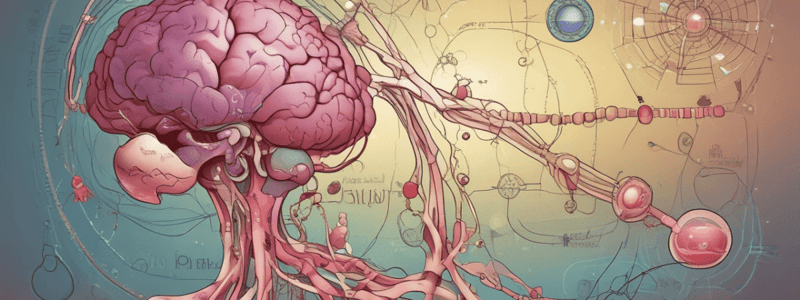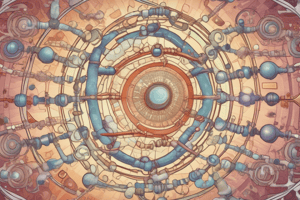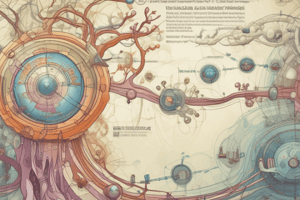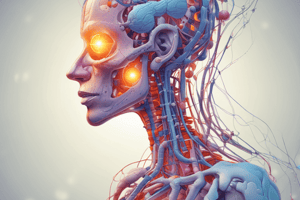Podcast
Questions and Answers
What is the primary function of hormones in the body?
What is the primary function of hormones in the body?
- To transmit electrical signals throughout the body
- To control and regulate the activities of certain cells and organs (correct)
- To produce energy for the body
- To protect the body from external damage
Which of the following is NOT a function of hormones?
Which of the following is NOT a function of hormones?
- Growth and development
- Metabolism
- Muscle contraction (correct)
- Sleep-wake cycle
What is the term for the process of transferring the signal into the cell?
What is the term for the process of transferring the signal into the cell?
- Signal transduction (correct)
- Cell signaling
- Hormone secretion
- Signal reception
What type of signaling occurs when a cell secretes a hormone that binds to receptors on the same cell?
What type of signaling occurs when a cell secretes a hormone that binds to receptors on the same cell?
What is the term for the balance of fluids and electrolytes in the body?
What is the term for the balance of fluids and electrolytes in the body?
Which system integrates the functions of the tissues in the body along with the endocrine system?
Which system integrates the functions of the tissues in the body along with the endocrine system?
What is the term for the type of signaling that occurs between cells that are close to each other?
What is the term for the type of signaling that occurs between cells that are close to each other?
What is the definition of a hormone according to the modern perspective?
What is the definition of a hormone according to the modern perspective?
What is the main characteristic of GI hormones?
What is the main characteristic of GI hormones?
What is the primary way hormones are removed from the body?
What is the primary way hormones are removed from the body?
What is the primary function of hormones in the body?
What is the primary function of hormones in the body?
What is the classification of hormones based on their biochemical nature?
What is the classification of hormones based on their biochemical nature?
Which of the following hormones is a peptide/protein hormone?
Which of the following hormones is a peptide/protein hormone?
Which of the following is NOT a characteristic of endocrine hormones?
Which of the following is NOT a characteristic of endocrine hormones?
What type of signaling occurs when two cells are adjacent and establish contact through gap junctions?
What type of signaling occurs when two cells are adjacent and establish contact through gap junctions?
Which hormone is NOT produced by the anterior pituitary gland?
Which hormone is NOT produced by the anterior pituitary gland?
Which hormone secreted by the heart is involved in regulating blood pressure and fluid balance?
Which hormone secreted by the heart is involved in regulating blood pressure and fluid balance?
What is the primary role of hypothalamic releasing factors?
What is the primary role of hypothalamic releasing factors?
Which of the following glands is NOT controlled by the pituitary gland?
Which of the following glands is NOT controlled by the pituitary gland?
Which hormone is produced by the thymus and is critical for T-cell development?
Which hormone is produced by the thymus and is critical for T-cell development?
What is the function of growth hormone (somatotropin) produced by the anterior pituitary?
What is the function of growth hormone (somatotropin) produced by the anterior pituitary?
Which of the following is correctly paired between hormone and its function?
Which of the following is correctly paired between hormone and its function?
Flashcards are hidden until you start studying
Study Notes
Hormones
- Hormones are chemical substances released from ductless or endocrine glands directly to the blood, controlling and regulating the activities of certain cells and organs.
- A modern definition of a hormone is that it is synthesized by one type of cells and transported through blood to act on another type of cells.
Functions of Hormones
- Hormones control many different bodily processes, including:
- Metabolism
- Homeostasis (constant internal balance), such as blood pressure, blood sugar regulation, fluid balance, and body temperature
- Growth and development
- Sexual function
- Reproduction
- Sleep-wake cycle
- Mood
Signal Transduction
- Signal transduction is the process of transferring the signal into the cell.
- There are two types of cells in signal transduction:
- The sender cell where the signal originates
- The target cell that receives the signal
Types of Signal
- Autocrine signaling: a cell secretes a hormone or chemical substance that binds to receptors on the same cell.
- Paracrine signaling: local mediators have their effect near the site of secretion without entering the circulation, with rapid and transient signaling between nearby cells.
- Juxtacrine signaling: occurs between adjacent cells through gap junctions or protein molecules on the surface of the two cells.
- Endocrine signaling: between cells located at a distance from each other, with the signal binding to specific target cell receptors with high affinity.
Hypothalamus
- The hypothalamus produces two types of endocrine factors:
- Hypothalamic neuropeptides (posterior lobe)
- Hypothalamic releasing factors (anterior lobe)
Pituitary Gland
- The pituitary gland is the master gland, controlling three endocrine glands: thyroid, adrenal glands, and gonads.
- The pituitary gland does not control parathyroid, adrenal medulla, and pancreas.
- The anterior pituitary secretes six hormones, each with distinct functions and target organs:
- Growth hormone (somatotropin)
- Thyroid-stimulating hormone (TSH)
- Adrenocorticotropic hormone (ACTH)
- Follicular-stimulating hormone (FSH)
- Luteinizing hormone (LH)
- Prolactin (PRL)
Other Endocrine Glands
- Heart: secretes atrial natriuretic peptide (ANP)
- Kidney: produces erythropoietin, renin, and 1,25(OH)2 cholecalciferol
- Thymus: produces thymopoietin and thymosin, inducing immunological competence in lymphocytes
- GI tract: produces gastrin, CCK, secretin, and somatostatin, among other GI hormones
Characteristics of Endocrine Hormones
- Hormones are secreted directly into the blood in small amounts and are very active.
- Some hormones have general actions, while others affect specific target organs.
- Hormones are removed either by target cell uptake, metabolism, inactivation by the liver, or excretion by the kidney.
Biochemical Structure and Synthesis of Hormones
- Hormones can be classified according to their biochemical nature into:
- Steroid hormones (e.g., adrenocorticosteroid hormones, androgens, estrogens, and progesterone)
- Amino acid derivatives (e.g., epinephrine, norepinephrine, and thyroid hormones)
- Peptide/protein hormones (e.g., insulin, glucagon, parathormone, calcitonin, pituitary hormones)
Studying That Suits You
Use AI to generate personalized quizzes and flashcards to suit your learning preferences.




